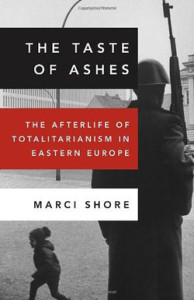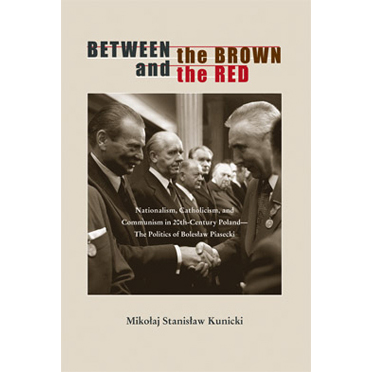 The Taste of Ashes: The Afterlife of Totalitarianism in Eastern Europe
The Taste of Ashes: The Afterlife of Totalitarianism in Eastern Europe
By Marci Shore
Crown Publishers, NY, 2013
You will either love or hate Marci Shore’s The Taste of Ashes: The Afterlife of Totalitarianism in Eastern Europe (2013). It is a complex and difficult intellectual journey – a highly personal one – interwoven by both heartwarming and heart-wrenching stories that show how the past has defined – and continues to do so – the present. This is not a typical study of the transition era. It does not offer a systematic identification and review of the many many changes that have taken place since the late 1980s. Neither it is about all of Eastern Europe, giving the bulk of attention to Poland and the former Czechoslovakia. But it is exactly the book’s unconventional tone and structure that make it a compelling read. In broadest strokes, Shore attempts to explain the peculiar role of history, asking whether we can ever account for certain events in the past. When setting the stage, the author asserts that “Eastern Europe is special. It is Europe, only more so. It is a place where people live and die, only more so.” It is indeed a place where the heavy burden of the past plays out in the everyday, where the ghosts of the past are ever present, and where people continue to account for the perceived sins of their parents and grandparents.
The Taste of Ashes is a personal journey, marked by both, wonderful and thought-provoking as well as not fully convincing moments – it is a study in human paradoxes, motivations and identity formation. Whether or not you agree with Shore’s vision of the past, your intellectual curiosity will be engaged. The extraordinary cast of characters – known and unknown, living and dead – is both strength and weakness. Shore allows all the characters to speak for themselves, and they all have much to say. But rather than a disciplined and linear narrative, the story is a mosaic of the author’s interactions and dialogue with her characters. The connections between people and ideas are not immediate and the themes not obvious. In many instances, they are subtle, open-ended and without definitive closure. But these interconnections between people and ideas amount to poignant and important revelations about a particular vision of Poland’s transition and the accompanying accounting with the past.
In the first instance, it is a story about the successes and failures of transition. It reveals a struggle of dissidents who find themselves in a new reality. For years, they had fought Communism. Their main goal was to overthrow an oppressive system, which disappeared suddenly, with a whimper. But, according to Shore, beyond the destruction of the old regime, these intellectuals did not have a plan for what would come next. What ensued was an existential crisis. For some, the grand expectations about life under freedom were left unfulfilled. Fighting for the “truth” and “authenticity”, they now had to abandon these for the requirements of democratic politics and the free-market economy.
At its core, The Taste of Ashes explores questions about the ways in which “the fall of communism had opened a Pandora’s box” of the past, demanding historical accounting. Firstly, Shore wants to understand dissidents – the generation that emerged in the 1960s – especially those whose parents had been ardent communists in the building of the regime after the Second World War. In order to comprehend their eventual rejection of Communism, she looks further back, at their parents. Why did they come to believe in Communism after the war? How could people like Jakub Berman and Wanda Wasilewska justify to themselves the atrocities that the construction of Stalinism demanded?
Shore does not provide a satisfactory answer – but that is not her objective. She wants to unpack the difficult decisions and the motives that guided people’s behaviour in incredibly complex and tough situations. Such reasoning is not meant to justify their actions as much as to understand them – certainly a difficult feat. People had different motives for believing in Communism: some were blindly dogmatic; some were simply idealistic, believing in the prospective utopia; still others arrived at Communism through the trauma of the war or the Holocaust. Some remained loyal to the system even when the system itself ousted them while others became disillusioned and promoted revisionism. One thing remained consistent: their engagement with Stalinism would hang over their heads, and those of their children and grandchildren. This was even more so amongst the Polish Jews.
The Jewish question in Poland becomes central to the other historical accounting that Shore explores in her book. For the Poles, the trauma of the war, the invasion by neighbours, the ensuing Holocaust, and the Communist takeover left a particular set of scars. After 1989, there was to be “national cleansing” of everything Communist. But how was this to be achieved – through lustrations and the opening of personal files at the Institute of National Remembrance (Instytut Pamięci Narodowej)? Would not the opening of such files amount to “former dissidents letting themselves be judged by their enemies?” Former dissidents wavered on the proper course of action. Kostek Gebert, the Polish Jewish journalist, rejected the idea while Adam Michnik, after much reflection, called for their opening.
There were also darker historical moments that began to surface and create ruptures in the Polish national identity and collective memory. There is no doubt that Jan Gross’ Neighbors opened a highly controversial historical reckoning, even if Shore ascribes to Gross a much too exaggerated role as the “conscience of the nation.” The narrative becomes an intricate conversation between the many sides of the debate, both Polish and Jewish. Most interestingly, the book offers a window into the evolution of Polish Jewish community after 1989 – the fierce discussions between the Zionists and “rootless cosmopolitans”, spiritual Jews and secular Jews, Polish Jews and non-Polish Jews, Polish Jews who only see a future in Israel, and Polish Jews who were exiled in 1968 but still feel deep connections to Poland. Shore reveals that the Jewish question in Poland is multifaceted and moves beyond accounting for Jedwabne.
There are Jews who visit Poland and all they can see is a graveyard, “an enormous mound of ashes, ashes and anti-Semites.” But there are also Polish Jews who love their country and who are searching for their own identity and voice within the national framework. They want to talk about postwar Polish Jews, their role in Communism, and the Judeo-Bolshevik stereotype. Shore also points out the paradoxes of the contemporary situation. Many Jews exiled in 1968 call Poland their home – “above all [they] still wanted to be – who still were – Poles”. But even today, many Polish Jews in Poland feel the need to hide their identity.
Marci Shore does not offer a solution to history’s ghosts and darker moments. She accepts that “the past could not be made okay.” All she hopes to accomplish – and she does this effectively – is to show the complexity of human motivation and decision-making in particular historical moments. After all, could we ever (and would we want to) make the past okay? In the end, she is also asking whether people should be made to account for the decisions of their parents and grandparents. There is no doubt that in Poland, history is a serious business. A family’s historical pedigree can make or break a political career. Given these circumstances, The Taste of Ashes sends a warning about the trappings of national historical cleansing, family pedigree, and identity formation. It indirectly speaks to the recent rise of populism and the ensuing political polarization in Poland, which has been embodied in debates about who is an “authentic” and “loyal” Pole. Simply put, she does not want anyone to have to prove their Polishness on account of their roots, religion or family history.
CR



